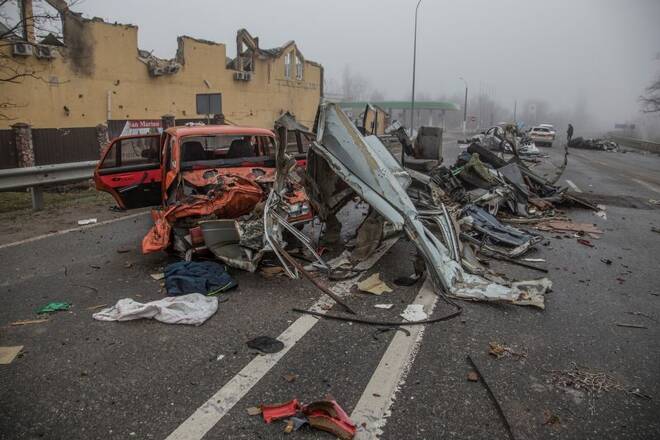Advertisement
Advertisement
Germany says West to agree more sanctions on Russia after Bucha killings
By:
(Reuters) - Ukraine's foreign minister called on the G7 on Sunday to impose "devastating" new sanctions on Moscow and accused Russia of carrying out a deliberate "massacre" in the town of Bucha outside Kyiv.
By Natalia Zinets
LVIV, Ukraine (Reuters) -Germany said on Sunday that the West would agree to impose more sanctions on Russia in the coming days after Ukraine accused Russian forces of war crimes near Kyiv, ratcheting up the already vast economic pressure on Russia over its invasion.
Russia’s economy is facing the gravest crisis since the 1991 collapse of the Soviet Union after the United States and its allies imposed crippling sanctions due to Putin’s Feb. 24 invasion of Ukraine.
Russia on Sunday denied its forces were responsible for the deaths of civilians in the town of Bucha and said Ukraine had staged a performance for the Western media.
Reuters saw corpses strewn across the town. One appeared to have his hands bound with white cloth, and to have been shot in the mouth. Ukrainian President Volodymyr Zelenskiy accused Russia of carrying out a genocide.
The West warned of more sanctions.
“Putin and his supporters will feel the consequences” of their actions, German Chancellor Olaf Scholz said in a statement to reporters.
German Defence Minister Christine Lambrecht said the European Union should talk about ending Russian gas imports.
Germany, Europe’s largest economy, has so far resisted calls to impose an embargo on energy imports from Russia, saying its economy and that of other European countries are too dependent on them. Russia supplies 40% of Europe’s gas needs.
Italy’s Foreign Minister Luigi Di Maio said the events in Bucha were “unleashing a wave of indignation that will lead to new sanctions” and did not exclude “that in the next few hours there could be a debate on the issue of imports of hydrocarbons from Russia”, he told a programme on Italy’s Rai 3 channel, adding Italy would not veto a fifth package of sanctions.
The United States said that those responsible for any war crimes must be held responsible, Britain said it was stepping up its sanctions and France condemned “massive abuses” by Russian forces in Ukraine.
Sanctions
The Kremlin says the West’s sanctions – the most burdensome in modern history – amount to a declaration of economic war and that Moscow will now look eastwards to partners such as China and India.
Largely cut off from the West’s economies, Russia is facing the biggest economic contraction for decades while prices are rising. Putin said that the West understands nothing about Russia if it thinks Russians will give in to sanctions.
Still, cutting off Russian gas – or more of Russia’s natural resources – would wipe out growth in Europe’s biggest economies, send energy prices to records and propel an inflationary shockwave through the global economy.
Russia, which has supplied gas to Europe since the 1970s, would be deprived of hundreds of billions of dollars in foreign currency earnings. It would likely toughen its response to the “economic war” of the West.
“The world is much bigger than Europe – and in fact Russia is much bigger than Europe – so sooner or later we will have a dialogue no matter what people across the ocean want,” Kremlin spokesman Dmitry Peskov told Channel One state television.
Ukraine called for a full oil, gas and coal embargo, a ban on Russian vessels and cargos and the disconnection of all Russian banks from SWIFT.
Russia’s Feb. 24 invasion of Ukraine has killed thousands of people and displaced millions.
Putin says the “special military operation” in Ukraine is necessary because the United States was using Ukraine to threaten Russia and Moscow had to defend against the persecution of Russian-speaking people by Ukraine.
Ukraine says Moscow launched a war of aggression and that Putin’s claims of persecution are nonsense.
(Writing by Guy FaulconbridgeEditing by Alexandra Hudson and Chizu Nomiyama)
About the Author
Reuterscontributor
Reuters, the news and media division of Thomson Reuters, is the world’s largest international multimedia news provider reaching more than one billion people every day. Reuters provides trusted business, financial, national, and international news to professionals via Thomson Reuters desktops, the world's media organizations, and directly to consumers at Reuters.com and via Reuters TV. Learn more about Thomson Reuters products:
Did you find this article useful?
Latest news and analysis
Advertisement
